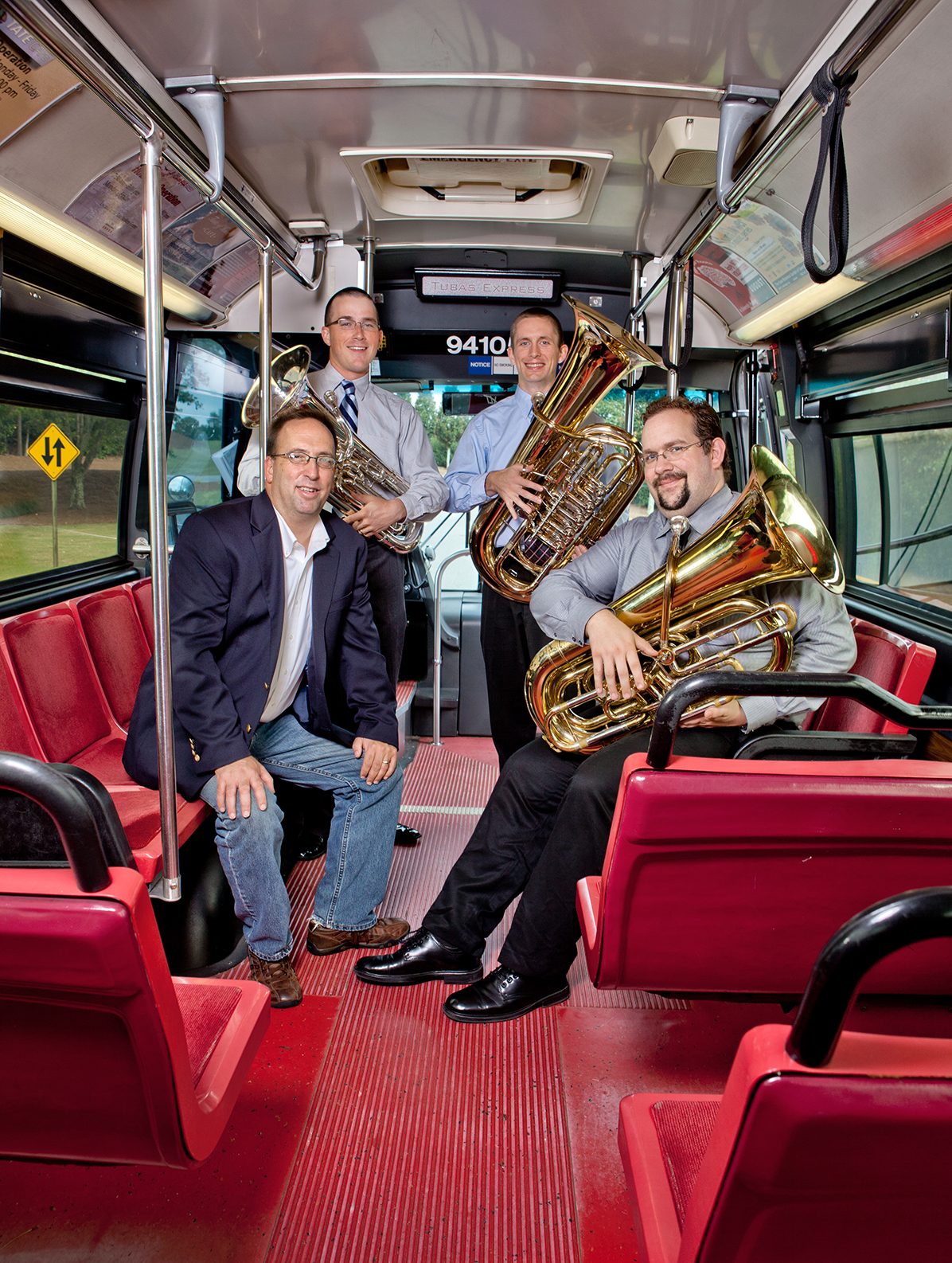Big Brass Big Sound Tuba
By: Cynthia Adams | Photos by: Nancy Evelyn
The air for these winning musicians is rare, fat, and fine
Is it harder to become a professional level musician, than, say, a quarterback? Actually, yes. And the business of building a top-ranked music program is not unlike college athletics at all, University of Georgia’s David Zerkel explains. It’s competitive. And only the truly fine survive the cut.
It may be an unwieldy, gawky-looking instrument, but the tuba is an anomaly on many fronts…it plays in THE lowest registers, going where other instruments cannot. Despite the tuba’s intimidating size, it does not take enormous lung capacity to play—actually, the opposite. It requires what musician and University of Georgia professor, David Zerkel, descriptively calls “fat air.”
And its fans are many. Tuba players are gregarious, happy. They play nicely with others. Apparently, this in no way dampens the musicians’ zeal to compete.
Last summer, Zerkel, a professor in the Hugh Hodgson School of Music, sent an exultant email to top UGA brass. The subject line ran: “News from Austria.” Zerkel’s news was that three doctoral students, Simon Wildman, David McLemore, and Matthew Shipes, had been successfully competing, and winning, in both national and international competitions near and far. Especially far.

Tuba graduate students on bus – Left to right #001 Matthew Tyler Snipes, Prof. David Zerkle (bus driver’s seat), David Boyd Mclemore, Simon Wildman
One, Wildman, had just competed in the 2012 International Tuba Euphonium in Linz, Austria. (Wildman took first prize.) McLemore had won national, regional and state first prizes for the 2012 Music Teachers National Association Solo Competition in New York City. Shipes had just won an appointment to the United States Air Force Band. And this was just the start—between them, the musicians had nabbed at least 22 awards and competitions since 2011.
It was, Zerkel said, an incredible accomplishment in face of the competition they met in places such as Austria, Germany, New York City and Washington, D.C.
And Zerkel thought this level of competition had made the musicians better than ever.
“The primary reason that I have my students enter competitions is so that they have a tangible goal for which they are preparing,” Zerkel said afterwards. “Just as in athletics, practicing with purpose makes all the difference in the world between improving a little and improving a lot. One of the things that I am most proud of with my studio is that a culture has been created where really focused hard work is the norm.” Zerkel had been down this path himself. He has had a career in both military bands and playing with top-tier symphony orchestras. He recently completed a term as president of the International Euphonium Association, where he still serves as a member of the executive board.
How had it happened that three UGA graduate students achieved such a stupefying level of success?
“What Simon, David and Matt accomplished in the past year is really exceptional. When any competition in anything is national or international in scope, one can be assured that the very finest players from all around the globe are competing. Four UGA students (David, Simon and undergrads Gary Garvin and Alex Avila) took four of the six top prizes at the most recent international competition, the Leonard Falcone International Competition in Michigan. Matt Shipes had advanced to the semi-final round for both tuba and euphonium, but had to withdraw as a result of winning a professional playing position. This type of representation is very rare, if not unprecedented. To have each of these guys be prize winners in multiple competitions is extremely rare.”
And there was more to blow his horn about, Zerkel added. “Matt has recently won a position in the United States Air Force Band in Washington, D.C. through a highly competitive national audition process. He is finished with his coursework and will complete his dissertation project within a year. Simon and David each will finish their coursework this year.”
With the enthusiasm of UGA Coach Mark Richt, a rightly proud Zerkel is a little puffed up. He predicts more successes for his hard-driven team of tuba players.
“We are trying to recruit the very best players that we can to our campus. Like football players, musicians want to land at a school where there is a clear record of success in the past, and more importantly in the present. They want to know that the coach, or in this case the teacher, has a vested interest in their development and that they are in a situation that will ‘get them to the next level.’ I always tell students who wish to perform for a living that they have much better odds of becoming a quarterback in the NFL or even a United States Senator. There are more jobs and the turnover rate is much higher. The level of excellence required to be successful in this business is daunting.”
This level of competition assures UGA gets the cream of the musical crop, Zerkel adds. “The Graduate School’s Assistantship and Fellowship programs help us to recruit the finest students to our campus. Without the generous funding provided to exceptional students, recruiting would be a much greater challenge.”









